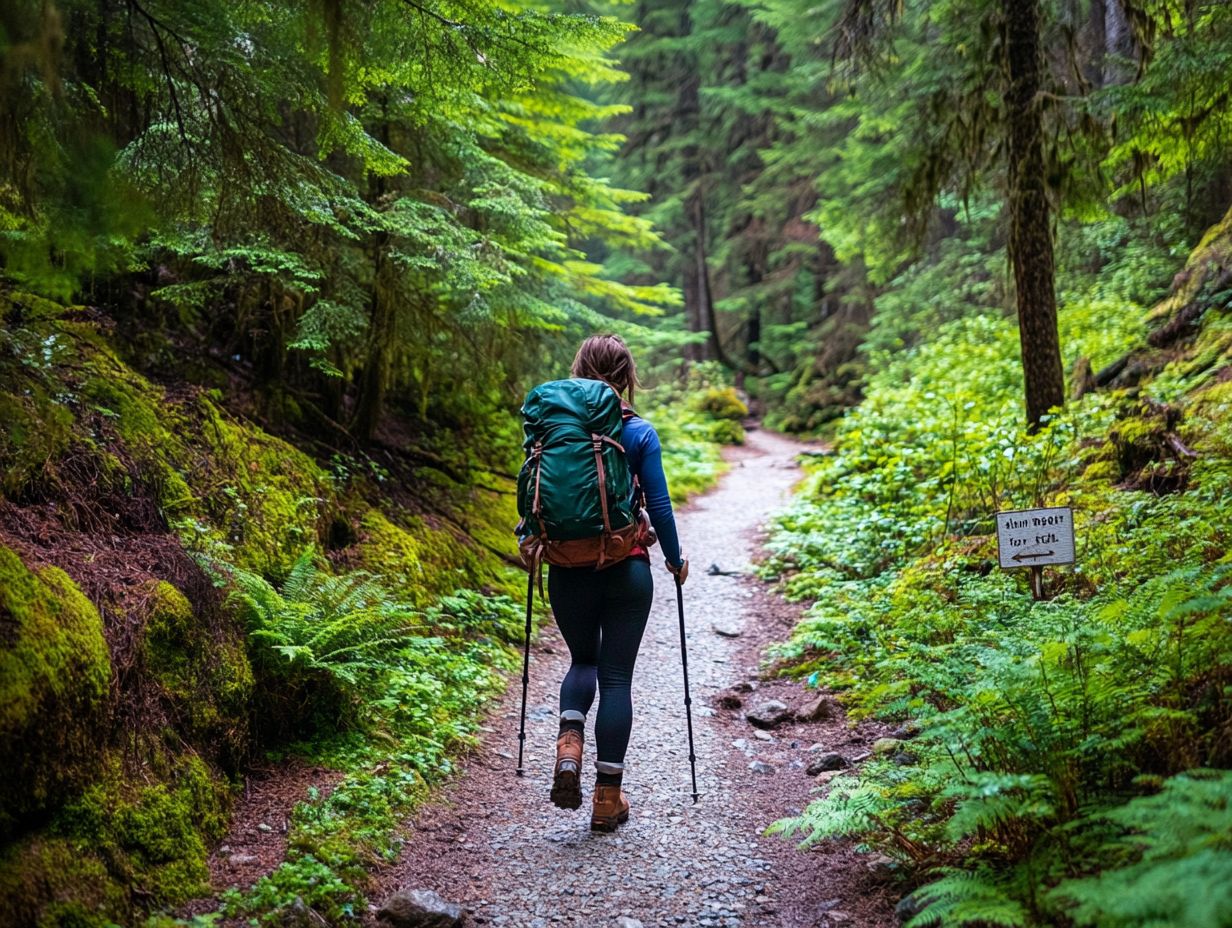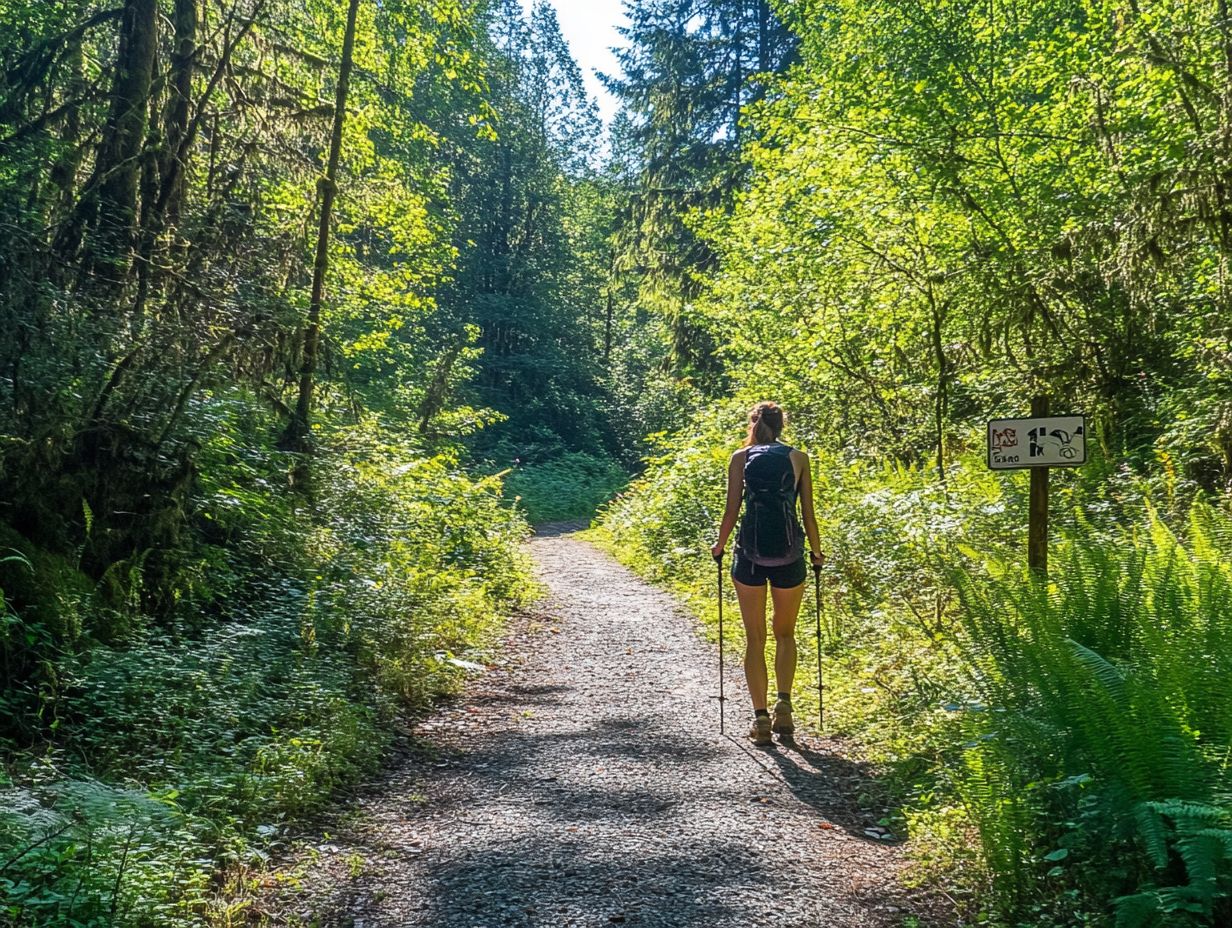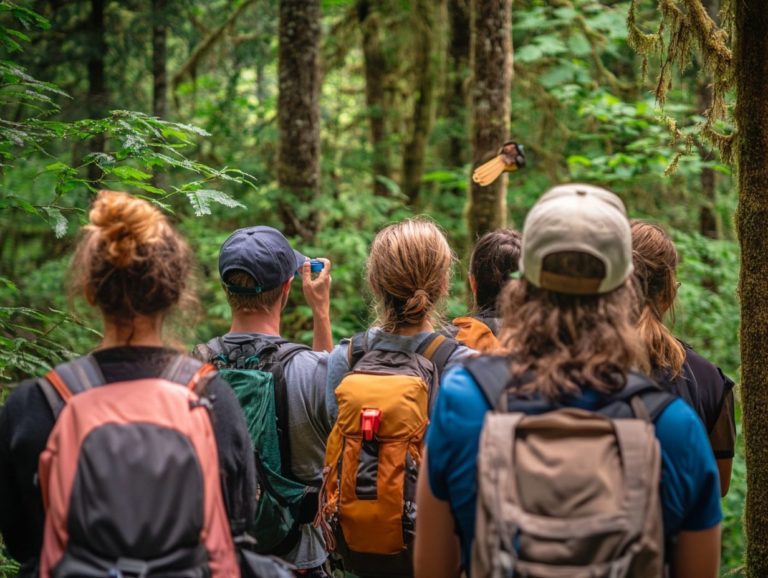5 Tips for Responsible Travel in National Parks
Visiting national parks presents a remarkable opportunity to connect with nature, but it s crucial to do so responsibly. With the recent surge in visitors, particularly during the COVID-19 travel phase, being informed is more important than ever!
This guide offers five easy tips to ensure your adventures are both sustainable and respectful of the environment. From planning ahead to respecting local wildlife and leaving no trace, every action you take contributes to preserving these natural treasures for future generations.
You ll also learn about the consequences of careless travel, common pitfalls to avoid, and effective ways to support conservation efforts. Embrace the journey of making your next national park visit enjoyable and beneficial for the ecosystem.
Contents
- Key Takeaways:
- 1. Get Ready: Plan Your Adventure!
- 2. Respect Wildlife and Their Habitat
- 3. Leave No Trace Behind!
- 4. Follow Park Rules and Regulations
- 5. Support Conservation Efforts
- Why Is Responsible Travel Important in National Parks?
- Frequently Asked Questions
- What are some tips for responsible travel in national parks?
- Why is responsible travel important in national parks?
- How can I minimize my environmental impact while visiting a national park?
- What should I do if I encounter wildlife while visiting a national park?
- Are there any specific guidelines for camping in national parks?
- What can I do to support the preservation of national parks?
Key Takeaways:

- Plan ahead to minimize your impact on the environment and wildlife in national parks.
- Respect wildlife by keeping a safe distance and not disturbing their natural behaviors.
- Leave no trace behind by properly disposing of waste and not taking anything from the park.
1. Get Ready: Plan Your Adventure!
Planning ahead is essential for a successful visit to national parks, especially given the recent surge in visitors spurred by COVID-19 travel. This situation underscores the importance of responsible travel practices.
Research park guidelines before your journey to enhance your safety and experience. By adhering to rules designed to protect resources and wildlife, you can truly appreciate the beauty around you. For those looking to make their trip even more eco-friendly, consider these 5 tips for sustainable camping adventures. Stay informed about peak times to avoid overcrowding and ensure a more serene visit!
Embrace eco-friendly travel practices, like using reusable containers and following Leave No Trace principles, to foster respect for the environment. For those visiting national parks, prioritize safety by checking weather conditions and setting up your tent away from water sources to avoid unexpected hazards.
Engaging with fellow outdoor enthusiasts is another rewarding aspect of your adventure. Sharing insights and tips enriches your experience while nurturing a community committed to celebrating the great outdoors!
2. Respect Wildlife and Their Habitat
Respecting wildlife and their delicate habitats is essential for preserving the delicate environments within national parks. Improper human interactions can lead to harmful effects on biodiversity and the overall health of these natural wonders.
As you explore these majestic landscapes, you’ll likely witness a variety of wildlife, from majestic elk grazing in meadows to diverse bird species soaring overhead! It s crucial to maintain a safe distance during these encounters to protect both yourself and the animals.
Park regulations typically enforce minimum distance guidelines and discourage feeding wildlife, as this can disrupt their natural behaviors and harm their health. By understanding and adhering to these rules, you promote a respectful coexistence with nature, vital for preserving the balance of ecosystems for future generations.
3. Leave No Trace Behind!
The Leave No Trace principles are vital for minimizing waste and ensuring that national parks remain pristine for future generations. Adopting eco-friendly practices during your visits is essential.
By implementing these seven principles: plan ahead, travel on durable surfaces, dispose of waste properly, leave what you find, minimize campfire impact, respect wildlife, and consider other visitors, you can significantly reduce your ecological footprint. For more insights, check out our guide on exploring nature reserves: eco-conscious tips.
Pack out all trash, including food waste, and use biodegradable soap when cleaning up to lessen your impact. Choosing eco-friendly gear, like reusable water bottles and sustainable camping equipment, reinforces your commitment to preserving these natural spaces!
4. Follow Park Rules and Regulations

Following park rules and regulations is essential for ensuring your safety and enjoyment while promoting taking care of the environment and responsible travel practices in national parks.
Understanding these guidelines cultivates a safer environment and enhances your personal experiences in the great outdoors. Familiarize yourself with regulations related to wildlife interaction, trail usage, and campfire restrictions to help preserve delicate ecosystems for future generations.
By adhering to these protocols, you show respect for nature and contribute to a collective sense of responsibility, fostering awareness about the importance of conservation efforts. Embracing park rules enriches your experience and deepens your appreciation for the natural world, transforming you from a casual adventurer into an informed advocate for our fragile ecosystems.
5. Support Conservation Efforts
Join the fight to protect our parks today! Supporting conservation efforts in national parks is essential for the long-term health and sustainability of these breathtaking natural habitats. Make a meaningful contribution by engaging with nonprofit organizations dedicated to preservation and exploring the rich history of local Indigenous communities.
By volunteering for park organizations, you gain a unique, hands-on experience while making a direct impact on the environment. Your donations to initiatives like Project Indigenous play a crucial role in funding essential research and community programs focused on ecological restoration.
Actively participating in local events deepens your connection to the land and cultivates a sense of community among fellow visitors. Recognizing the role of Indigenous communities is crucial in conservation. Learning from their traditional ecological knowledge helps you appreciate the delicate balance of these ecosystems.
Embracing these opportunities for support fosters your personal growth and contributes to a collective effort to preserve the stunning beauty and biodiversity of our national parks.
Why Is Responsible Travel Important in National Parks?
Responsible travel in national parks is essential for lessening your environmental impact, especially given the rising overcrowding issues that jeopardize fragile ecosystems and the overall experience for visitors in these beloved natural spaces.
With a staggering 327 million visits to national parks in the United States alone, the pressure on these habitats is mounting. This unchecked influx can result in soil erosion, disturbances to wildlife, and the degradation of native plants all clear indicators of irresponsible tourism.
By embracing responsible travel practices, you play an active role in preserving these stunning landscapes. Simple actions like sticking to designated trails, keeping noise to a minimum, and adhering to Leave No Trace principles can greatly diminish your eco-footprint. For more ideas, check out the top 10 eco-conscious activities in national parks.
For instance, in 2020, parks like Yellowstone National Park, which capped visitor numbers at 4,500 per day, experienced a 20% improvement in local wildlife sightings, highlighting the positive effect of exploring natural wonders responsibly on maintaining nature’s delicate balance.
What Are the Consequences of Irresponsible Travel in National Parks?
Irresponsible travel in national parks can have serious environmental repercussions, such as introducing invasive species, increasing how humans interact with wildlife, and damaging delicate ecosystems. These actions ultimately compromise the very integrity of these breathtaking natural wonders.
Consider littering: it not only tarnishes the landscape’s beauty but also endangers wildlife that might ingest harmful materials. Encroaching on animal habitats risks causing stress or altering their behaviors, disrupting breeding patterns and leading to population declines.
The unintentional spread of invasive species often hitching a ride on your shoes or gear can outcompete native plants and animals, deteriorating biodiversity.
These behaviors diminish your scenic experience and could deter future visitors who are eager to connect with nature in a way that isn t tainted by human impact and promote cultural tourism.
How Can You Contribute to Conservation Efforts in National Parks?

Contributing to conservation efforts in national parks is within your reach through a variety of meaningful actions. You can support nonprofit organizations dedicated to preservation, adopt sustainable practices, and show respect for wildlife during your visits.
To amplify your impact, you can also volunteer for local conservation projects. These initiatives often seek hands-on assistance for tasks like trail maintenance or removing invasive species.
Participating in educational programs will equip you with valuable knowledge about local ecosystems, helping you appreciate these natural wonders.
Making donations to targeted conservation initiatives can significantly bolster efforts to preserve habitats and advance research. By integrating sustainable practices into your travel routines like minimizing waste and opting for eco-friendly accommodations you can ensure that your footprint remains light.
By doing this, you help protect our national parks for future generations.
Common Mistakes Travelers Make in National Parks
Common mistakes made by travelers in national parks often arise from a lack of understanding of park guidelines. This can lead to disappointing experiences and increased risks to both personal safety and environmental conservation.
Many people inadvertently overlook essential regulations, such as sticking to designated trails and following campfire restrictions, putting delicate ecosystems at risk. You might also underestimate the importance of preparation; ignoring factors like weather conditions or trail difficulty can compromise your safety.
Respecting wildlife is another crucial element. Getting too close can disturb animals and lead to dangerous encounters.
By enhancing your awareness and taking straightforward steps, such as reading park materials, planning ahead, and practicing responsible wildlife viewing, you can significantly elevate your experience while preserving the natural beauty of these cherished landscapes. For more guidance, consider following best practices for camping responsibly.
Ready to Explore? Educate Yourself Before Your Park Visit!
Educating yourself before visiting a national park is crucial for enhancing your overall experience. You can achieve this by tapping into resources that cover park guidelines, local Indigenous history, and conservation efforts.
Explore official park websites for maps, safety protocols, and details about seasonal activities. Visitor centers are also goldmines of information, often featuring insightful exhibits and guided tours that can enrich your journey.
Engaging with resources from the local Indigenous community further enhances your understanding of the land’s cultural significance and traditional ecological knowledge, deepening your appreciation for the natural environment.
Outdoor education plays a pivotal role in this journey, fostering a sense of stewardship and a reflective relationship with nature. It encourages you to explore and learn about the intricate interconnectedness of ecosystems, making your visit all the more meaningful.
Sustainable Travel Practices to Implement in National Parks
Implementing sustainable travel practices in national parks is essential for minimizing waste and conserving these delicate ecosystems. This allows you to enjoy your experience while positively impacting the environment.
By steering clear of single-use plastics, you can significantly reduce your ecological footprint. Opting for eco-friendly gear elevates your outdoor adventures and supports industries dedicated to sustainability.
Engaging in leave-no-trace initiatives enables you to take responsibility for your surroundings. These practices highlight the critical importance of preserving biodiversity and maintaining the untouched beauty of national parks.
When you adopt these sustainable habits, you transform into an active participant in environmental conservation. This ensures that future generations will have the opportunity to marvel at breathtaking landscapes and diverse wildlife.
Frequently Asked Questions

What are some tips for responsible travel in national parks?
Always follow designated trails. Stay on marked paths to protect habitats and wildlife.
Throw away trash correctly and recycle whenever you can. This keeps the park clean and beautiful.
Respect wildlife. Observe them from a distance and never feed them.
Use eco-friendly products that break down naturally. This minimizes your impact on the environment.
Learn the park s rules before your visit. Knowing them will help you follow them.
Why is responsible travel important in national parks?
Responsible travel preserves the beauty of national parks for future generations. It protects the ecosystems and wildlife that live there.
How can I minimize my environmental impact while visiting a national park?
Use public transportation to reduce carbon emissions. Bring refillable water bottles instead of using single-use plastic.
Stay on designated trails to avoid harming vegetation. Every little action counts!
What should I do if I encounter wildlife while visiting a national park?
Observe from a safe distance. Remember, these animals are wild and should be respected.
Are there any specific guidelines for camping in national parks?
Always camp in designated areas. This helps the environment and keeps your experience safe.
Dispose of waste properly and leave your campsite as clean as you found it.
What can I do to support the preservation of national parks?
You can donate to organizations that protect national parks. Participate in volunteer programs and spread the word about responsible travel!






